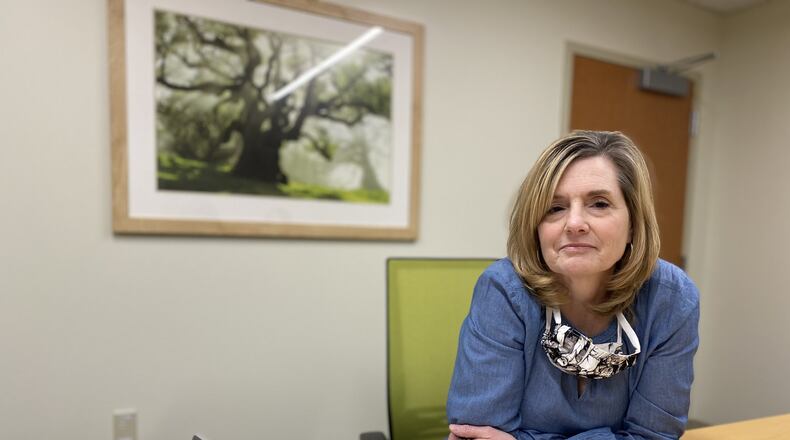MORE: CORONARIVUS: Complete coverage from the Dayton Daily News
Mary Proctor, public health nurse coordinator with Public Health- Dayton & Montgomery County, said everyday is a little bit different for nurses during the pandemic because the situation is fluid and evolving.
She’s managing the COVID-19 response for the organization that’s relative to the contact tracing for people who either have the coronavirus or those are being quarantined because they have been exposed to someone that has tested positive for the virus.
“Most of the nurses in my department start out checking to see from hospitals or doctors if we have a positive coronavirus case,” Proctor explained. “From there, we do technical and data and enter it into the system.”
A nurse gets assigned to the case, and is in charge of following up and connecting with the person who has tested positive to obtain all of the pertinent information involved with the case.
“It can be quite time consuming to let the patient tell their story, and there is a lot of education being provided to help the patient as well,” Proctor said. “Some individuals are so sick they can’t talk to us in one sitting, and we have to call back multiple times to get all of the information.”
The intensity involved with helping somebody during the pandemic is immense, as often times nurses find the person going through being sick with the coronavirus doesn’t have anyone else to talk to about it.
MORE: National Nurses Week: From ballerina to nurse, area woman fulfilling life’s calling
“Sometimes people are living alone and they don’t have that support system to be able to talk about their experience,” Proctor said. “They may have more needs and we have to tap into more resources here at Public Health.”
Many people going through a positive diagnosis is humbling for nurses according to Proctor.
“The stories vary so much,” she said. “The amount of information coming to us is changing often and we have to watch for burnout with our nurses. We are looking at the long-term of this right now 12 to 18 months out. This is something we are going to have to work at for quite some time.”
Proctor said that nurses want to help people, and provide a certain level of comfort and compassion to any patient in any circumstance.
“Each nurse’s journey is a little bit different. Our nurses are working so hard seven days a week,” she said.
Toni Welch, 52, currently works for Trilogy Health Service’s Village Green Campus in Greenville Ohio as a nurse dealing with senior living patients. She is one of those nurses who finds out that the career path can take you anywhere.
She was supposed to graduate from Hondros College in April, but instead found out that due to the coronavirus, not only would graduation be postponed, but when Gov. Mike DeWine signed legislation that allowed her and other nursing grads to enter the workforce by obtaining temporary licenses to aid in the national novel coronavirus emergency.
MORE: Administrators ‘in awe’ of how nurses perform during coronavirus
“They knew I was in nursing school and they called me in April after the legislation was signed and said ‘hey you have a nursing license are you ready?’” she explained.
Welch said it was kind of scary situation since she had not yet taken hear board exams.
“It is still challenging and I a still learning,” she said. “I through my focus on the residents, who because of the coronavirus restrictions don’t get to see their families. They are being maintained in their rooms so they can stay safe. It made me grow closer to my residents because I’m all they have.”
The nursing role for Welch has morphed into becoming more of a family member at times.
“Nurses have to go in and let them know they are okay,” she said, referring to elderly patients. “Sometimes they just need to see you smile. You are covered with your mask and you have to step way back and lower your mask and let them see your face. Tell them, ‘We will get through this.’”
Welch has always wanted to be a nurse, and it’s something that runs in the family. Her daughter Heather, 32, is also a Hondros grad, and is now the director of nursing at Oakleaf Village in Sylvania, Ohio.
MORE: National Nurses Week begins today: ‘Our nurses are truly…heroes’
“I told her when she was young she could be either a doctor, nurse or a lawyer,” Welch said, adding that Heather wanted to run a nail salon. “I said well, you have to get a degree and maybe you can do that part-time, but now she’s farther along as a nurse than I am.”
She gave the same advice to her son, Jacob, 20, who now works in a Toledo prison facility.
“You know, nursing isn’t easy and it is not for everyone,” Welch said. “You have to care and make your patients feel that they are the number one thing in your life.”
Dianna Tabern, campus dean/director of Nursing at Hondros College’s Fairborn campus, said nurses are trained to be ready to combat the situations they are facing while working during the pandemic and during any other time.
“The rigors of training and academics are always the same and we teach how to be safe everyday. Washing hands and wearing masks and following the rules is taught everyday” she said. “Nurses have to be committed and I them that the intense rigors they are put through is because they have other peoples lives in their hands.”
MORE: Rise in overdose deaths spurs addiction services expansion in Dayton area
About the Author
